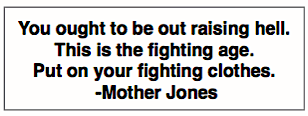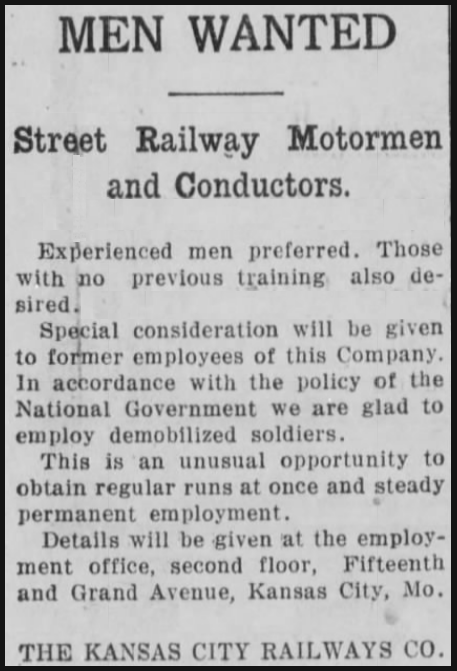 ~~~~~~~~~~~~~~~~~~~~~~~~~~~~~~~~~~~~~~~~~~~~~
~~~~~~~~~~~~~~~~~~~~~~~~~~~~~~~~~~~~~~~~~~~~~
Hellraisers Journal – Sunday December 22, 1918
Kansas City Street Car Strike Continues, Scabs Wanted
Of the 2700 strikers, members of the Amalgamated Association of Street and Electric Railway Employes of America, Division 764, on strike in Kansas City since December 11th, 157 are conductorettes. The conductorettes have been on the picket line beside their brothers and not one of them has crossed the line and returned to work. Meanwhile the company advertises for scabs, “no previous training” needed.
From the Kansas Junction City Union of December 21, 1918:
It should be noted that ever since the cars have been operated by non-union men, accidents and deaths on the street car lines have dramatically increased. Yet, the Company prefers to hire inexperienced scabs rather than implement the cost-of-living award granted to their employees by the War Labor Board.
~~~~~~~~~~~~~~~~~~~~~~
SOURCES & IMAGES
Quote Mother Jones Raising Hell, NYT p1, Oct 6, 1916
“You ought to out raising hell.”
The Junction City Union
(Junction City, Kansas)
-Dec 21, 1918
KC Street Car Strike, Ad for Scabs
https://www.newspapers.com/image/96257078/
SOURCE
The Motorman and Conductor
“Official Journal of the
Amalgamated Association of Street and
Electric Railway Employes of America”
(Detroit, Michigan)
-Dec 1917-Nov 1919
The Association, 1919
https://books.google.com/books?id=u2FJAAAAYAAJ
Edition of Jan 1919
https://play.google.com/books/reader?id=u2FJAAAAYAAJ&hl=en&pg=GBS.PT280
“Strikes and Lockouts-Kansas City, Kansas”
https://play.google.com/books/reader?id=u2FJAAAAYAAJ&hl=en&pg=GBS.PT290
STRIKES AND LOCKOUTS Kansas City, Kans.—Div. 764, reported in the last issue to have gone on strike Dec. 11 [1918] to enforce the installation of an award of the War Labor Board directing an increase in wages, remains in an unsettled condition. The hearing was given by the War Labor Board in January in Washington, D. C. The decision of the Board directed to the company and to the members of the Kansas City local as stated in a telegram from Hon. Charlton Ogburn of the War Labor Board addressed to Attorney Cliff Langsdale, who represents the employes in Kansas City, reads: “The Board directs that the employes of the company who struck on the 11th day of December, 1918, shall be re-instated by the company on Monday, Feb. 3, 1919, with such seniority rights as they had on Dec. 11, and that on a future Monday, Feb. 3, 1919, they shall receive the wages in accord with the award already made without regard to the performance of the condition.” Following this award appeared the statement in a Kansas City paper in which it is alleged that Pres. Kealy of the company, upon being asked for this opinion of the award, replied that the war board on three different instances had given out that they have not the power to enforce their rulings, and intimated that the company would refuse to comply with the order of the War Labor Board. Further developments in the strike is that of an order issued by Judge Pollock citing Attorney Cliff Langsdale, Vice Pres. Frank O’Shea, Pres. Michaels and others of the Local Division and the trade union movement of Kansas City, Kans. and Mo., to appear to answer charges of contempt of court. Under this order the persons cited have been arrested and released on bail. The charge is for violation of an injunction issued by Judge Pollock of the Federal District Court in which Kansas City, Kans., is located, wherein it is charged that the defendants have interfered with the operation of the cars as being operated by a U. S. Marshall, under the direction of the court. The charge includes interference with interstate commerce as guaranteed by the Federal law. At last report reaching the general office, hearings in these cases had been deferred to Tuesday Feb. 11. Refusal of the company to comply with the War Labor Board’s award may involve a legal question from the fact that the original appearance before the War Labor Board and its award was based upon the positive agreement between the company and employes to abide by the decision of the War Labor Board. It is quite possible that the law would compel observance of the arbitration agreement, in which case the company would be compelled to re-instate its employes and abide by the War Labor Board award.
The source above includes:
Sixteenth Convention Proceedings
Official Report of the Proceedings of the 16th Convention
of the Amalgamated Association of Street
and Electric Railway Employes of America
Held at Chicago, Ill., September 8 to 17, 1919
https://play.google.com/books/reader?id=u2FJAAAAYAAJ&hl=en&pg=GBS.PT623
Ninth Day, Wednesday Morning Session, September 17, 1919
https://play.google.com/books/reader?id=u2FJAAAAYAAJ&hl=en&pg=GBS.PT751
Delegate Donahue of Div. 764 Speaks
https://play.google.com/books/reader?id=u2FJAAAAYAAJ&hl=en&pg=GBS.PT754
Delegate Donahue, Div 764, was granted the privilege of the floor for five minutes to address the convention in regard to the strike in Kansas City.
The delegate gave an interesting review of the trouble in that city, stating that the men did not go out on strike until after the company had refused to abide by the award of the War Labor Board, which provided for a wage of 48 cents per hour. He informed the delegates that every newspaper in Kansas City, as well as the city and State administration, were against the strikers; that out of the 2700 members who came out on strike on December 11th, of last year the company had succeeded in getting back only 190 platform men, and 210 of the power house men, line men and track men. He paid tribute to the conductorettes, 157 of whom were members of Division No. 764, and in not one single instance did they return to the employ of the company. He stated that 2020 of the men who went on strike are now engaged in other lines of employment. He quoted figures from the city and county records to show that during the year 1918, while the union men were operating the cars, only five persons were killed by street cars, while in the first three months of 1919, when the cars were being operated by non-union men, fifteen persons were killed. He further stated that 190 cars were broken up in the same period of three months by collisions.
In closing he thanked the officers and members of the Association and the members of organized labor in Kansas City for the support given the members of Division No. 764, in their trouble.
Following Brother Donahue’s statement, unanimous consent was obtained for the introduction of the following resolution:
Resolution No. 125, by Del. Chas. M. Foster, Div. 817.
Whereas, our Kansas City brothers have been on strike and later locked out, and further, that the following bodies have generously and liberally come to the financial assistance of our brothers in Kansas City, therefore, be it
Resolved, that this convention voice its appreciation and heartfelt thankfulness, through the Secretary of the Amalgamated Association, by communicating a letter to such bodies—the Kansas City Industrial Council, Carpenters’ Union No. 61, Kansas City Musicians, Kansas City Moving Picture Operators, Mr. W. Wear, Business Agent Sugar Creek Local 303, Mr. Herbert Rivers.
The resolution was adopted, and Delegate Donahue stated that if the letter of thanks was communicated to Secretary Smith of the Industrial Council he would in turn communicate it to the various bodies which had rendered assistance to the street car men.
[Emphasis added.]
See also:
History of the Labor Movement in the United States, Vol. 8
Postwar Struggles, 1918-1920
-by Philip S. Foner
(search: “kansas city the streetcar strike”)
https://books.google.com/books?id=UMBWNCXcR8wC
The National Labor Board of 1918-1919
https://en.wikipedia.org/wiki/National_War_Labor_Board_(1918%E2%80%931919)
~~~~~~~~~~~~~~~~~~~~~~~~~~~~~~~~~~~~~~~~~~~~~
Casey Jones – Mark Ross
Lyrics by Joe Hill

